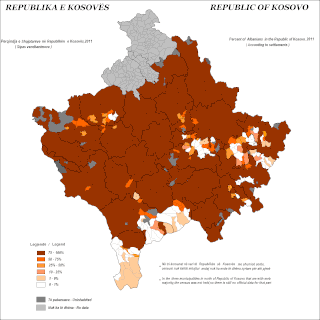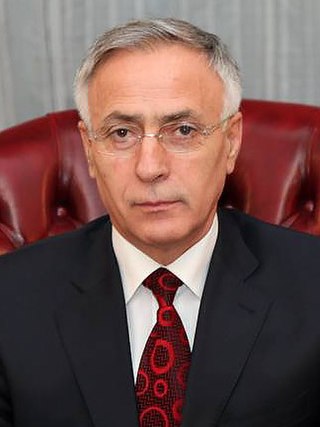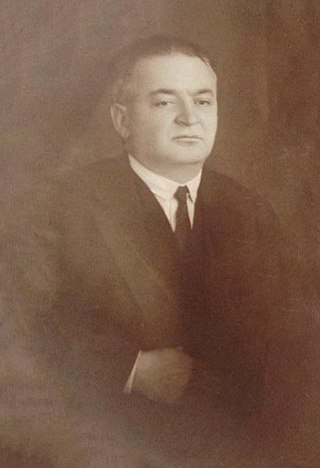
The Kosovo War was an armed conflict in Kosovo that lasted from 28 February 1998 until 11 June 1999. It was fought between the forces of the Federal Republic of Yugoslavia, which controlled Kosovo before the war, and the Kosovo Albanian rebel group known as the Kosovo Liberation Army (KLA). The conflict ended when the North Atlantic Treaty Organization (NATO) intervened by beginning air strikes in March 1999 which resulted in Yugoslav forces withdrawing from Kosovo.

The Kosovo Liberation Army was an ethnic Albanian separatist militia that sought the separation of Kosovo, the vast majority of which is inhabited by Albanians, from the Federal Republic of Yugoslavia (FRY) and Serbia during the 1990s. Albanian nationalism was a central tenet of the KLA and many in its ranks supported the creation of a Greater Albania, which would encompass all Albanians in the Balkans, stressing Albanian culture, ethnicity and nation.

Medveđa is a town and municipality located in the Jablanica District of southern Serbia. As of 2022 census, the municipality has a population of 6,438 inhabitants.
Drenas, also known as Gllogoc or Glogovac, is a town and municipality in central Kosovo. As of the 2011 census, there were 6,143 people residing in Drenas and 58,531 in the municipality.

The Albanians of Kosovo, also commonly called Kosovo Albanians, Kosovar/Kosovan Albanians or occasionally "Kosovars/Kosovans", constitute the largest ethnic group in Kosovo.

The Drenica is a river in Kosovo, a 50 km-long left tributary to the Sitnica river. It flows entirely within Kosovo and gives its name to the surrounding Drenica region.

Jakup Krasniqi is a Kosovo-Albanian politician and former acting President of Kosovo. He is former Chairman of the Assembly of Kosovo. In November 2020 he was arrested for charges of crimes against humanity and war crime filed before the Kosovo Specialist Chambers.

Pristina is the capital and largest city of Kosovo. It is the administrative center of the eponymous municipality and district.

Bedri Pejani was 20th century Albanian politician. During World War II, he was one of the founders of the Second League of Prizren.
Lapušnik or Llapushnik prison camp was a detention camp that was operated by the Kosovo Liberation Army, an Albanian militant organization, near the city of Glogovac in central Kosovo during the Kosovo War. It was operational in early 1998 and inmates were subject to intimidation, imprisonment, violence and murder. The victims were both Serbs and Albanians.
Albert Bunjaki is a Kosovan professional football coach and former player who is the current manager of IF Karlstad.

The Drenica massacres were a series of killings of Kosovo Albanian civilians committed by Serbian special police forces in the Drenica region of central Kosovo.

The Catholic Church has a population in Kosovo of approximately 65,000 in a region of roughly 2 million people. Another 60,000 Kosovan Catholics are outside the region, mainly for work. They are mainly ethnic Albanians, with a few Croats.

The Committee for the National Defence of Kosovo was an Albanian organization founded in Shkodër on 1 May 1918. It was mainly consisted of the political exiles from Kosovo and was led by Hoxha Kadri from Pristina. It existed in looser form since May 1915.

FC Feronikeli 74, commonly referred to as Feronikeli 74 and colloquially known as Feronikeli is a professional football club based in Drenas, Kosovo. The club play in the Football Superleague of Kosovo, which is the top tier of football in the country.

The Insurgency in Kosovo began in 1995, following the Dayton Agreement that ended the Bosnian War. In 1996, the Kosovo Liberation Army (KLA) began attacking Serbian governmental buildings and police stations. This insurgency would lead to the more intense Kosovo War in February of 1998.
Rexhep Rexhepi is a multi-purpose stadium in Glogovac, Kosovo. The ground serves as the home ground of KF Feronikeli.
KB Feronikeli is a professional basketball club based in Glogovac, Kosovo. Its fan club is called Black Tigers.
Islam Dobra (1934-2012) is a historian and educator from the Drenica region of Kosovo.

The Six Oaks of Likoshan are a grove of Quercus pubescens trees in the village of Likoshan in the Glogovac municipality, in the Drenica region of Kosovo. The very old trees are among Kosovo's few natural monuments. The locals call it Te Lisat Gjashtënjakë since they emerge from one root. In 2006, the organism was labeled a botanic monument under the official categorization MN/031. Besides its natural value, it has historical significance, since the Kosovo Liberation Army fought its first battle on 28 February 1998 by its trunk.














